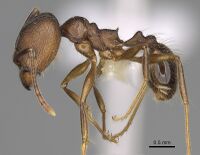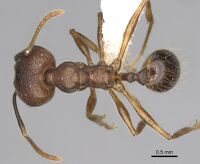Pheidole besalon
| Pheidole besalon | |
|---|---|

| |
| Scientific classification | |
| Kingdom: | Animalia |
| Phylum: | Arthropoda |
| Class: | Insecta |
| Order: | Hymenoptera |
| Family: | Formicidae |
| Subfamily: | Myrmicinae |
| Tribe: | Attini |
| Genus: | Pheidole |
| Species: | P. besalon |
| Binomial name | |
| Pheidole besalon Longino, 2019 | |
This species inhabits mature lowland rainforest in southern Mexico. Only one collection is known, from Los Tuxtlas Biological Station. A nest was in a vertical clay bank in forest. A large irregular opening led to shallow chambers.
Identification
Longino (2019) - Minor: face mostly smooth and shiny, with faint foveolation between eye and frontal carinae; head weakly tapering posteriorly; promesonotal groove impressed; dorsal pronotum weakly foveolate; lateral pronotum smooth and shiny; katepisternum foveolate; propodeal spines about one third length of posterior face of propodeum; gaster smooth and shining; abundant flexuous erect setae on mesosomal dorsum and gaster, tibiae; color red brown.
Major: inner hypostomal teeth widely spaced, acicular; scape base thickened, about as wide as apex; face evenly covered with foveolation overlain with reticulate rugae; propodeal spines one fourth length of posterior face of propodeum; gastral dorsum smooth and shining; sides of head with decumbent to fully appressed pilosity; dorsal face and mesosoma nearly devoid of pilosity, with inconspicuous short subdecumbent setae; tibiae with long but fully decumbent setae (in contrast to minor worker); gastral dorsum with abundant flexuous erect setae.
Measurements, minor worker: HW 0.58, HL 0.73, SL 0.99, EL 0.16, WL 0.98, PSL 0.05, PTW 0.12, PPW 0.16, CI 79, SI 172, PSLI 9, PPI 134 (n=1).
Measurements, major worker: HW 1.24, HL 1.29, SL 1.03, EL 0.21, WL 1.31, PSL 0.08, PTW 0.22, PPW 0.32, CI 97, SI 83, PSLI 6, PPI 143 (n=1).
The minor worker of this species has the general habitus of Pheidole indagatrix, Pheidole purpurea, and others. The major worker has a uniformly and densely sculptured face, the scapes are flattened, and the pilosity on the side of the head is appressed (similar to Pheidole susannae). This combination of minor and major worker characters is unique.
Distribution
Latitudinal Distribution Pattern
Latitudinal Range: 18.58461° to 18.58461°.
| North Temperate |
North Subtropical |
Tropical | South Subtropical |
South Temperate |
- Source: AntMaps
Distribution based on Regional Taxon Lists
Neotropical Region: Mexico (type locality).
Distribution based on AntMaps
Distribution based on AntWeb specimens
Check data from AntWeb
Countries Occupied
| Number of countries occupied by this species based on AntWiki Regional Taxon Lists. In general, fewer countries occupied indicates a narrower range, while more countries indicates a more widespread species. |

|
Estimated Abundance
| Relative abundance based on number of AntMaps records per species (this species within the purple bar). Fewer records (to the left) indicates a less abundant/encountered species while more records (to the right) indicates more abundant/encountered species. |

|
Biology
Castes
Worker
Minor
Images from AntWeb
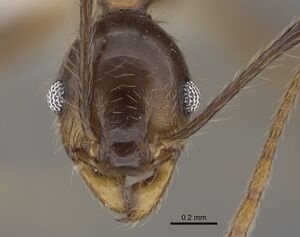 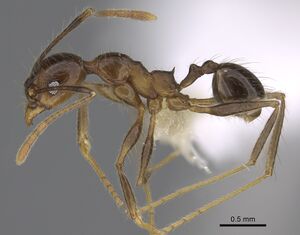 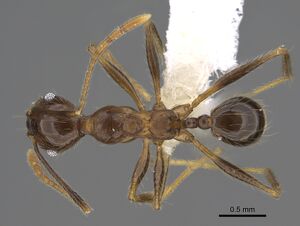 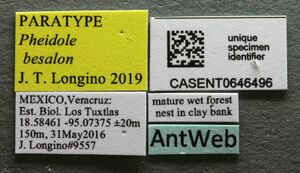
| |
| Paratype. Worker (minor). Specimen code CASENT0646496. Photographer Michele Esposito, uploaded by California Academy of Sciences. | Owned by CAS, San Francisco, CA, USA. |
Nomenclature
The following information is derived from Barry Bolton's Online Catalogue of the Ants of the World.
- besalon. Pheidole besalon Longino, 2019: 26, fig. 38 (w.) MEXICO.
Type Material
- HOLOTYPE: 1 major worker, Mexico, Veracruz: Estación de Biología Los Tuxtlas, 18.58461 -95.07375 ±20 m, 150 m, 31-May-2016, mature wet forest, nest in clay bank (J. Longino, JTL9557) [UNAM, unique specimen identifier CASENT0631747].
- PARATYPES: major, minor workers: same data as holotype [CAS, MCZC, UNAM].
Description
see the identification section above
Etymology
Greek for brick, in reference to being found in a vertical clay bank.
References
References based on Global Ant Biodiversity Informatics
- Longino J. T. 2019. Pheidole (Hymenoptera, Formicidae) of Middle American wet forest. Zootaxa 4599: 1-126
